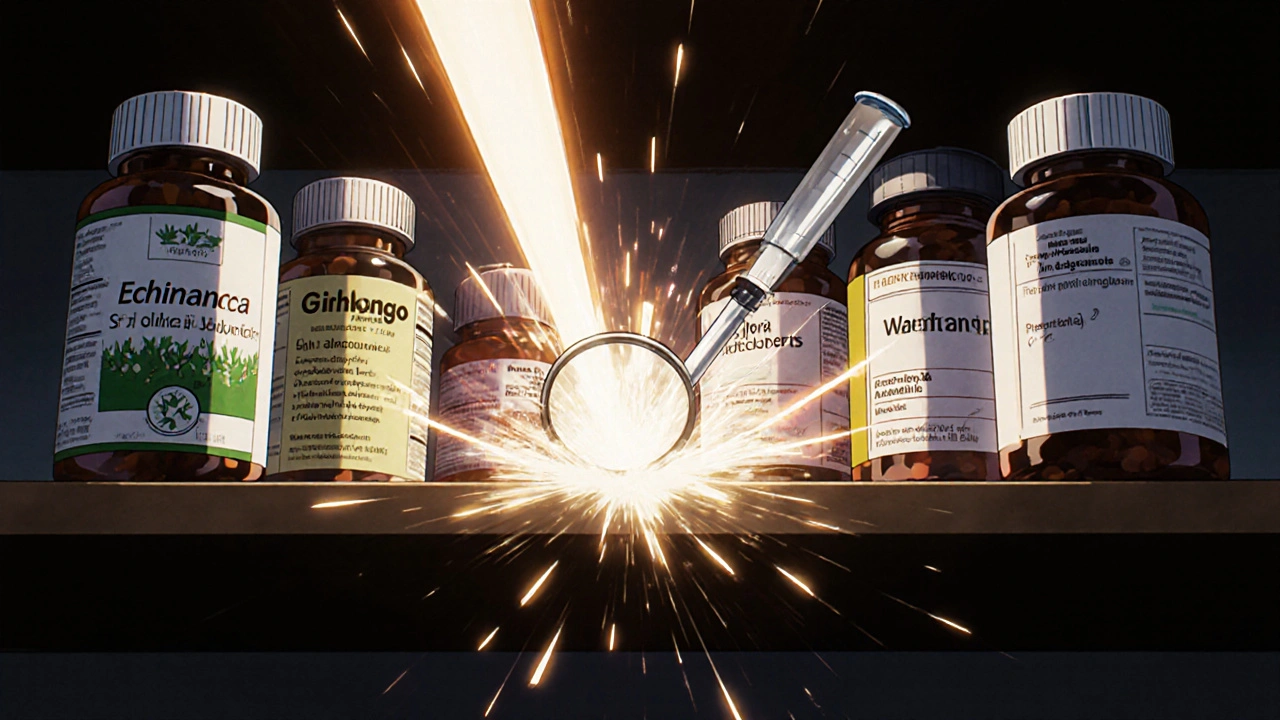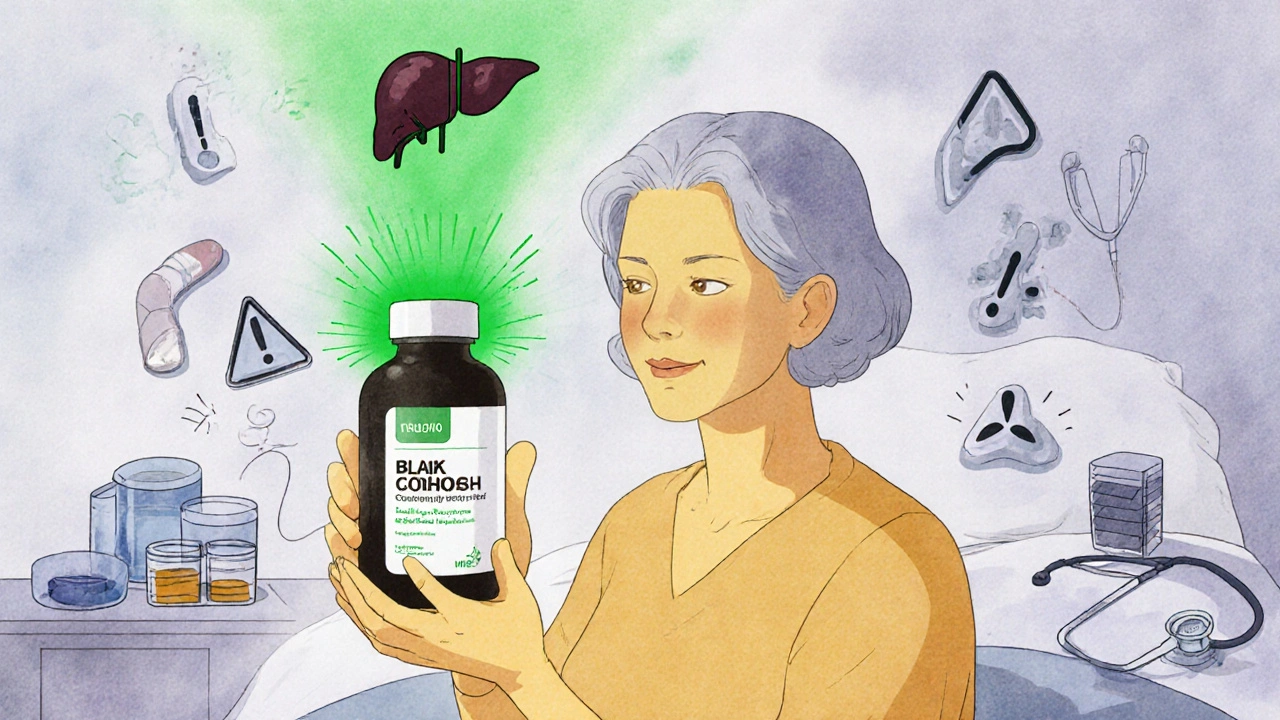Supplement-Medication Interaction Checker
This tool checks for evidence-based interactions between supplements and prescription medications. It is not a substitute for professional medical advice. Always consult your doctor before combining supplements with medications.
People turn to natural remedies and supplements hoping to ease side effects from medications, manage chronic symptoms, or avoid pharmaceuticals altogether. It’s easy to assume that if something is natural, it’s safe. But that’s not true. Herbal supplements can cause serious harm - sometimes worse than the drugs they’re meant to replace.
Why ‘Natural’ Doesn’t Mean Safe
The idea that natural equals safe is one of the biggest myths in health. A 2016 JAMA review found that herbal products can trigger everything from mild rashes to liver failure, seizures, and even death. The FDA tracked over 800 adverse events linked to ephedra between 1995 and 1999. About half of those cases involved heart attacks or strokes in people under 40. That’s not a fluke. It’s a pattern. Many people don’t realize that supplements aren’t tested like prescription drugs. Under the Dietary Supplement Health and Education Act of 1994 (DSHEA), companies don’t need to prove safety or effectiveness before selling their products. The FDA can only act after harm is done - and even then, it’s slow. That means you’re basically a test subject every time you open a bottle of herbal capsules.Black Cohosh: For Hot Flashes - But Watch Your Liver
Black cohosh is one of the most popular supplements for menopausal hot flashes. Some studies suggest it works - but only if it’s a specific, standardized extract like Remifemin®. Generic brands? No guarantee. A 2023 Cleveland Clinic review found that while black cohosh may help with hot flashes, it’s linked to rare cases of liver damage. And here’s the catch: it’s often unclear if the liver injury comes from the herb itself or from contaminants like heavy metals or pesticides in the product. Women over 50 are at higher risk. If you’re taking black cohosh and notice yellowing skin, dark urine, or unusual fatigue, stop immediately and get your liver checked. And if you have a history of breast cancer? Talk to your doctor first. Even though early fears about estrogen-like effects have been largely dismissed, no one wants to risk triggering something serious.Echinacea: Might Help Colds - But Not for Everyone
Echinacea is marketed as a cold fighter. Some studies show it might slightly reduce the length of a cold, but the effect is small. More importantly, it’s not safe for everyone. If you have allergies to ragweed, daisies, marigolds, or chrysanthemums, you’re at risk of an allergic reaction - think swelling, hives, or trouble breathing. People with autoimmune diseases like lupus or multiple sclerosis should avoid it entirely. Echinacea can overstimulate the immune system, making these conditions worse. And because it’s sold as a supplement, there’s no standard dose. One brand might have 300mg of active compounds; another might have 30mg. You’re guessing what you’re taking.
St. John’s Wort: The Silent Drug Killer
St. John’s wort is often promoted as a natural antidepressant. It may help mild depression - but its real danger lies in what it does to other medications. This herb turns on a liver enzyme called CYP3A4, which speeds up how fast your body breaks down drugs. The result? Your pills stop working. Research from 2000 in Clinical Pharmacology & Therapeutics showed St. John’s wort reduces blood levels of birth control pills by 15-24%. That’s enough to cause unintended pregnancy. It also lowers the effectiveness of antidepressants, HIV meds, blood thinners, and even some cancer drugs. People have ended up in the hospital because they didn’t know this interaction existed. If you’re on any prescription medication, don’t touch St. John’s wort without talking to your doctor. And if you’re already taking it, tell your doctor - even if you think it’s harmless.Herbal Interactions: The Hidden Danger
Cranberry juice is good for your bladder - or so we’re told. But if you’re on warfarin, a blood thinner, cranberry can increase your risk of bleeding. Same with Ginkgo biloba. It’s sold for memory support, but it thins the blood too. Combine it with aspirin or ibuprofen, and you’re playing Russian roulette with internal bleeding. Even common herbs like liquorice can be dangerous. Up to 3% of people who consume it - often in Japanese herbal formulas - develop pseudohyperaldosteronism. Symptoms include high blood pressure, swelling in the legs, low potassium, and muscle weakness. In severe cases, it causes seizures. And because liquorice is hidden in so many blends, people don’t even know they’re taking it. Bupleurum root, used in traditional Chinese medicine, has been linked to urinary problems and blood in the urine - not from infection, but from an allergic reaction. These aren’t rare side effects. They’re documented, repeatable, and preventable.Older Adults Are at Higher Risk
As we age, our kidneys and liver slow down. That means drugs - and herbal supplements - stay in our bodies longer. A 2016 JAMA study warned that older adults are more likely to suffer harmful effects from herbal products because their bodies can’t clear them efficiently. A 70-year-old taking turmeric for joint pain might not realize it’s building up in their system. Combine that with blood pressure meds or diabetes drugs, and you’ve created a dangerous cocktail. The same goes for ginger, garlic, or any supplement marketed as “mild.” In older adults, mild can turn into life-threatening.
Contamination Is Common - And Deadly
A 2015 study by the Botanical Adulterants Prevention Program found that nearly 25% of herbal products tested contained ingredients not listed on the label. Some had toxic metals like lead or mercury. Others were laced with prescription drugs - like steroids or erectile dysfunction pills - to make them “work faster.” The Drug-Induced Liver Injury Network found that only 13% of suspected herbal liver injuries between 2004 and 2013 could be confirmed as caused by the herb itself. The rest? Contaminants, mislabeled plants, or hidden chemicals. You can’t trust the bottle. Even brands sold in reputable stores aren’t always clean.What Actually Works - And How to Use It Safely
Some natural remedies have solid evidence. Ginger, for example, is proven to reduce nausea from chemotherapy or pregnancy. Peppermint oil can ease IBS symptoms when taken in enteric-coated capsules. But even these have limits. Here’s how to use supplements safely:- Always tell your doctor what you’re taking - even if you think it’s “just herbal.”
- Don’t combine supplements with prescription drugs without checking for interactions.
- Choose brands that are third-party tested (look for USP, NSF, or ConsumerLab seals).
- Avoid products with vague labels like “proprietary blend” - you have no idea what’s inside.
- If you start feeling worse after starting a new supplement, stop it and call your doctor.
- Report adverse effects to the FDA’s Safety Reporting Portal (safetyreporting.hhs.gov).
The Bottom Line
Natural remedies aren’t magic. They’re powerful substances with real risks. The fact that they’re sold without prescriptions doesn’t make them safer - it makes them riskier. You’re not protecting yourself by choosing herbs over pills. You’re just changing the type of danger you face. If you’re dealing with side effects from a medication, talk to your doctor about adjusting the dose or switching drugs. There are safer, tested options. Don’t gamble with your health on a bottle labeled “natural.”Are natural remedies safer than prescription drugs?
No. Many herbal supplements carry serious risks, including liver damage, dangerous drug interactions, and even death. Unlike prescription drugs, they aren’t tested for safety before being sold. The FDA only steps in after harm occurs.
Can I take herbal supplements with my prescription medications?
You shouldn’t without talking to your doctor first. St. John’s wort, Ginkgo biloba, and cranberry can interfere with blood thinners, birth control, antidepressants, and more. Even common herbs like ginger and garlic can increase bleeding risk during surgery. Always disclose everything you’re taking.
How do I know if a supplement is contaminated?
You can’t tell just by looking. Independent testing labs like USP, NSF, or ConsumerLab verify purity and potency. Look for their seals on the bottle. Avoid products labeled “proprietary blend” - they hide what’s inside. Even trusted brands have been found to contain toxic metals or hidden drugs.
Is black cohosh safe for menopause symptoms?
Only specific, standardized forms like Remifemin® have shown possible benefit for hot flashes. Generic brands vary widely in quality and may not work at all. There are rare reports of liver damage, so stop use and see a doctor if you develop yellowing skin, dark urine, or extreme fatigue. If you have breast cancer, consult your oncologist first.
Why do some people say supplements helped them while others got sick?
Everyone’s body reacts differently. What works for one person might cause side effects in another. Product quality varies wildly - two bottles of the same herb can have completely different ingredients. Contaminants, wrong plant species, or hidden drugs can cause unexpected reactions. Personal stories aren’t proof - science is.
What should I do if I think a supplement is making me sick?
Stop taking it immediately. Write down what you took, how much, and when symptoms started. Contact your doctor or go to urgent care. Then report the reaction to the FDA at safetyreporting.hhs.gov. This helps others avoid the same problem.


Ashley Durance
November 14, 2025 AT 19:46People act like herbal supplements are harmless tea. I’ve seen three cases of drug-induced liver failure from black cohosh alone. The FDA’s database is full of these stories. You think you’re being ‘natural’-you’re just poisoning yourself slowly. No one checks labels. No one knows what’s really in that bottle. And then they blame the pharma companies when they end up in the ER.
It’s not about being anti-natural. It’s about being anti-ignorant.
Scott Saleska
November 15, 2025 AT 15:33St. John’s wort messing with birth control? Yeah, I heard a girl got pregnant because she took it for ‘anxiety’ and didn’t tell her OB. She was mad when she found out. But here’s the thing-she also didn’t read the tiny print on the bottle. The supplement industry thrives on people not reading. They’re not hiding it. You just don’t care enough to look.
And don’t get me started on ‘proprietary blends.’ That’s just corporate speak for ‘we don’t want you to know what’s in here.’
Ryan Anderson
November 16, 2025 AT 14:33👏 Big respect to the author for laying this out so clearly. So many people think ‘natural’ = ‘no side effects’ and it’s terrifying. I used to take ginkgo for ‘brain fog’-until I started bruising like a toddler after a tumble. Turns out it thins the blood. My doctor said if I’d had surgery, I could’ve bled out.
Now I only buy USP-certified stuff. And I tell every single doctor I see what I’m taking-even the acupuncturist. 🙏
Eleanora Keene
November 17, 2025 AT 21:08I just want to say thank you for writing this. I’ve been on meds for depression for years and my sister convinced me to try St. John’s Wort because ‘it’s all natural.’ I didn’t know it could make my antidepressants useless. I felt worse than ever-like my brain was shutting down. I stopped it cold turkey and called my doctor right away.
You’re not weak for needing medicine. You’re smart for asking questions. Keep speaking up. 💪
Joe Goodrow
November 19, 2025 AT 04:52Why do we let this happen? In America, we let some guy in a basement bottle up ‘herbal energy boosters’ with lead in them and sell them online. Meanwhile, real drugs go through 12 years of testing. This isn’t freedom. It’s negligence. And it’s not just stupid-it’s dangerous. We need real regulation. Not ‘trust the market’ nonsense.
Don Ablett
November 20, 2025 AT 16:30Contamination rates in herbal products are alarmingly high. A 2021 meta-analysis of 1200 samples across North America and Europe showed 28% contained undeclared pharmaceuticals. In 11% of cases, these were controlled substances. The regulatory framework is fundamentally broken. Without mandatory batch testing and transparent labeling, consumer safety remains a lottery.
Third-party certification is not optional. It is the bare minimum.
Kevin Wagner
November 21, 2025 AT 09:35Let’s be real-this post is FIRE. 🌟 I used to be one of those people who popped turmeric pills like candy. ‘Anti-inflammatory!’ ‘Superfood!’ Then I started getting weird stomach cramps. Turned out it was interacting with my blood pressure med. My doc laughed and said, ‘You think garlic is gentle? Try 10 grams of it with a beta-blocker.’
Stop treating herbs like candy. They’re not. They’re potent. Treat them like medicine. Because they are.
gent wood
November 22, 2025 AT 20:31There’s a quiet epidemic here. Older adults, especially those on multiple medications, are being quietly poisoned by supplements they think are harmless. I’ve seen it in my practice. Mrs. Henderson, 78, took ginger for arthritis, didn’t tell anyone, and ended up with a GI bleed after a minor fall. She didn’t even connect the dots.
We need better education-not more supplements. People need to know that ‘natural’ doesn’t mean ‘no risk.’ It means ‘unregulated risk.’
Dilip Patel
November 24, 2025 AT 04:28you think usa is bad wait till u see india where people buy ayurvedic stuff from street vendors and mix it with their allopathic meds... one guy died from heavy metal poisoning because he took 'pitta balance' powder from a guy on a bike. no labels no testing no nothing. why do u think we have so many liver cases? its not just the west. its global. and no one cares.
the system is broken everywhere
Jane Johnson
November 25, 2025 AT 20:26Actually, the data on St. John’s wort and birth control is inconclusive. Several recent meta-analyses show minimal interaction in therapeutic doses. The 2000 study you cite used a much higher dosage than is typical today. Also, the FDA’s adverse event reports are self-reported and unverified. Correlation does not equal causation.